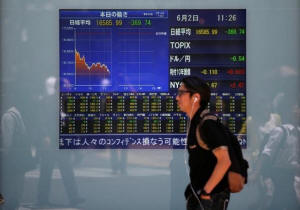|
Global stocks reboot after another tech
sell-off
 Send a link to a friend
Send a link to a friend
 [June 16, 2017]
By Marc Jones [June 16, 2017]
By Marc Jones
LONDON (Reuters) - World shares steadied on
Friday after selling in the tech sector triggered their biggest fall in
over a month, while the yen slid to a two-week low as the Bank of Japan
signaled its stimulus was staying in place.
It was set to be the second week of falls for MSCI's widely tracked
world index, although Europe, which has been the star performer in the
first half of the year, was trying to end it on an upnote.
London <.FTSE>, Frankfurt <.GDAXI> and Paris <.FCHI> climbed between 0.3
and 0.5 percent [.EU] and the euro <EUR=EBS>, the pound <GBP=D3> and the
Swiss franc <CHF=> rose against the dollar in the currency markets.
[/FRX]
Greece's 10-year government borrowing costs fell to their lowest in
almost a month in bond markets as well, as euro zone finance ministers
and the International Monetary Fund approved a long-delayed 8.5 billion
euro lifeline for Athens, albeit keeping them hanging on for debt
relief.
"The things that we were worried about at the start of the year which
were French elections and potentially a Greek deal not getting done, we
have had all the good news on that now," said State Street Global
Markets' strategist Michael Metcalfe.

He said the dollar's rise for the week suggested markets had now priced
in that positive news - France's new President Emmanuel Macron is
expected to get a parliamentary majority at the weekend too - and were
thinking where to go next.
The Japanese yen hit a two-week low against the dollar after the Bank of
Japan left its mass money printing program unchanged, maintaining the
contrast with the U.S. Federal Reserve, which signaled further
tightening this week.
It was trading 0.3 percent lower at 111.23 yen <JPY=D4> per dollar,
while the euro <EUR=EBS> was buying $1.1173 compared with almost $1.13
earlier in the week.
The yen's drop helped Japan's Nikkei <.N225> advance 0.7 percent,
narrowing its loss for the week to 0.3 percent.
"The market was relieved that there was no mention of an exit strategy,
at least for now," said Yoshinori Shigemi, global market strategist at
JPMorgan Asset Management.
SUBMERGING MARKETS
MSCI's broadest index of Asia-Pacific shares outside Japan
<.MIAPJ0000PUS> ended down roughly 0.85 percent for the week though for
emerging markets more broadly it was looking like being the worst week
of the year so far.
Russian stocks <.IRTS> steadied on Friday but have been hammered more
than 4 percent this week and the rouble <RUB=> is down for a third
straight week, on talk of increased Western sanctions and as oil prices
have stumbled back again. [EMRG/FRX]
[to top of second column] |

A man walks in front of a screen showing today's movements of Nikkei
share average outside a brokerage in Tokyo, Japan, June 2, 2016.
REUTERS/Issei Kato

Overnight, the Nasdaq <.IXIC> led losses on Wall Street, dragged
lower again by shares including Apple <.AAPL.O> and Alphabet
<GOOGL.O> that tumbled on bearish analysts' reports.
The broader S&P 500 index <.SPX> fell 0.2 percent and the Dow Jones
Industrial Average <.DJI> slipped 0.1 percent though future's prices
pointed to a modest recovery later. <ESc1>
"It was a brutal day for the tech sector once again as investors are
increasingly more worried about the (Federal Reserve) tightening
cycle and how that would put a number of firms in trouble," Naeem
Aslam, chief market analyst at ThinkMarkets in London, wrote in a
note.
The number of Americans filing for unemployment benefits fell more
than expected last week, and better-than-expected business
conditions numbers also bolstered the case for the Fed to continue
raising rates after its second hike of the year on Wednesday.
Sterling <GBP=D3> added almost 0.2 percent to $1.2775. On Thursday,
it jumped to as high as $1.2795 on signs of a shift in the Bank of
England's stance on keeping interest rates at record lows.
In commodities, oil remained subdued however on continued worries
over rising U.S. gasoline inventories adding to already elevated
global supply.
Global benchmarks Brent <LCOc1> and U.S. crude <CLc1> hovered at
$47.34 and $44.74 a barrel, on track for 2.4 and 2.8 percent drops
for the week respectively. It will also be their fourth consecutive
week of falls.

The dollar's strength kept gold <XAU=> flat at $1,255 an ounce,
failing to make up Thursday's 0.6 percent drop. It is poised to
close the week with a 1 percent loss, its second weekly decline.
(Additional reporting by Nichola Saminather in Singapore Editing by
Jeremy Gaunt)
[© 2017 Thomson Reuters. All rights
reserved.]
Copyright 2017 Reuters. All rights reserved. This material may not be published,
broadcast, rewritten or redistributed. |